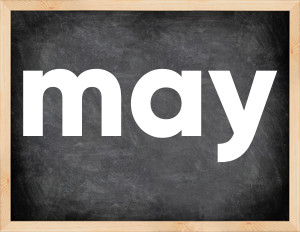 The English verb 'may' is pronounced as [meɪ].
The English verb 'may' is pronounced as [meɪ].
Related to:
irregular verbs,
modal verbs.
3 forms of verb may: Infinitive (may), Past Simple - (might), Past Participle - (might).
Here are the past tense forms of the verb may
👉 Forms of verb may in future and past simple and past participle.
❓ What is the past tense of may.
May: Past, Present, and Participle Forms
| Base Form | Past Simple | Past Participle |
|---|---|---|
| may [meɪ] |
might [maɪt] |
might [maɪt] |
What are the 2nd and 3rd forms of the verb may?
🎓 What are the past simple, future simple, present perfect, past perfect, and future perfect forms of the base form (infinitive) 'may'?
Learn the three forms of the English verb 'may'
- the first form (V1) is 'may' used in present simple and future simple tenses.
- the second form (V2) is 'might' used in past simple tense.
- the third form (V3) is 'might' used in present perfect and past perfect tenses.
What are the past tense and past participle of may?
The past tense and past participle of may are: may in past simple is might, and past participle is might.
What is the past tense of may?
The past tense of the verb "may" is "might", and the past participle is "might".
Verb Tenses
Past simple — may in past simple might
(V2).
Future simple — may in future simple is may (will + V1).
Present Perfect — may in present perfect tense is
might
(have/has + V3).
Past Perfect — may in past perfect tense is
might
(had + V3).
may regular or irregular verb?
👉 Is 'may' a regular or irregular verb? The verb 'may' is irregular verb.
Examples of Verb may in Sentences
- Our companies may prefer state support (Present Simple)
- The committee might pay greater attention to management effectiveness (Past Simple)
- Something he may never tell his parents (Present Simple)
- Companies may prefer internationally agreed standards in meeting client expectations (Present Simple)
- They may or may not succeed. (Present Simple)
- People might understand you, but you didn't use that chance (Past Simple)
- She might have met friends, but we don't know for sure (Present Perfect)
- I thought you might be hungry (Past Simple)
- We thought you might have helped that children (Present Perfect)
- I suggested that a cup of mint tea might calm her down (Past Simple)